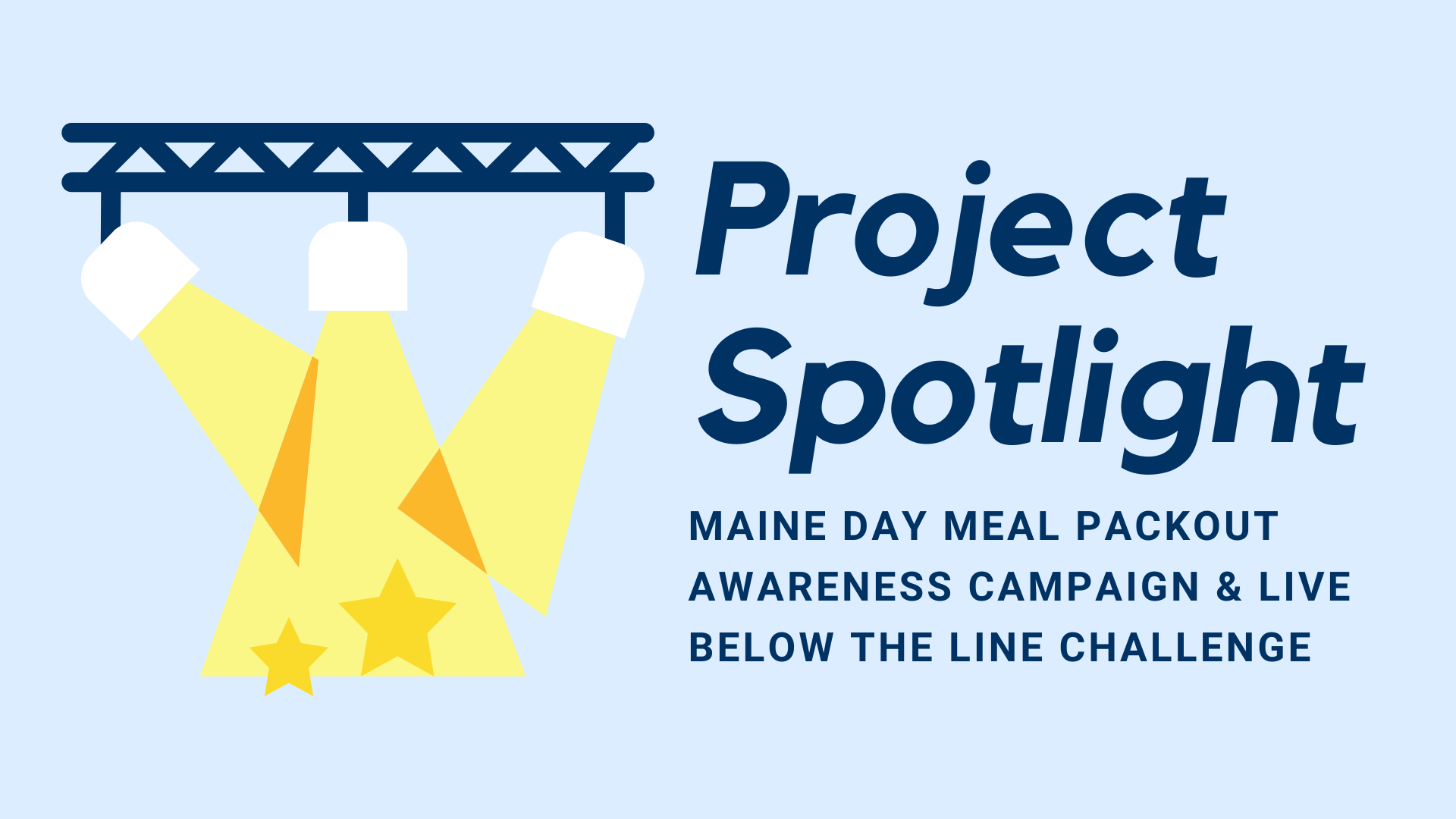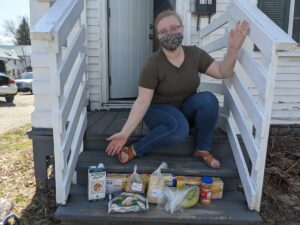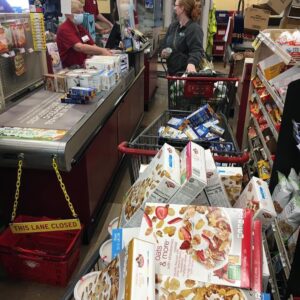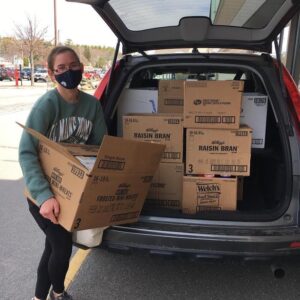
Project Spotlight: Maine Day Meal Packout Awareness Campaign and Live Below the Line Challenge
Project Spotlight is a monthly series dedicated to sharing outstanding Honors projects, both in and out of the classroom. This month, we are highlighting the Maine Day Meal Packout (MDMP) Awareness Campaign and their Live Below the Line Challenge, organized by Dominique DiSpirito and Megan Driscoll.


HC: Please describe the Maine Day Meal Packout Awareness Campaign and the “Live Below the Line” Challenge fundraiser.
DD: In light of the social distancing requirements, we knew that we would not be able to hold a traditional Maine Day Meal Packout (MDMP) event featuring hundreds of volunteers packed into the Memorial Gym. Instead, we set out to focus on raising awareness about food insecurity on college campuses. We knew part of our efforts would have to include a strong social media presence, but we also wanted to plan programs that would engage community members. The first event was our Food Insecurity Panel that featured student workers, alumni, and experts on college food insecurity from the area to discuss questions about hunger on campus.
Megan presented the idea of the “Live Below the Line Challenge” as an opportunity for members of the MDMP team to take on the challenge of learning about food insecurity on a personal level. The challenge, organized internationally each year, challenges participants to purchase no more than their country’s extreme poverty line’s worth of food for five days. The participants would then donate the difference between what they spent and what their normal grocery bill would be. We hosted a modified version of the challenge that invited participants to live on $2 a day for 5 days. Megan and I took on the challenge, purchasing $10 worth of food for 5 days and posting updates and fundraising asks to our social media accounts.
HC: What inspired you to organize the MDMP Awareness Campaign and complete the “Live Below the Line” Challenge?
DD: This year’s MDMP Awareness Campaign presented an opportunity to address one crucial component of fighting food insecurity that had not been as emphasized in previous years: raising awareness about food insecurity. While our efforts to organize a large service event to pack and distribute meals across the state raised awareness indirectly, it did not focus on challenging the stigmas, educating about the challenges, or engaging in the complexity of food insecurity in the same way that we were able to this year.
MD: I think another goal of the MDMP awareness campaign was to set the precedent that the Honors College Student Advisory Board (SAB) can and will do whatever we can to combat food insecurity, regardless of the circumstances.

HC: Describe what it was like “living below the line” for a week. What kinds of challenges did you face?
DD: Taking on the Challenge completely changed my relationship with food. I was used to being able to go to the Union or to the dining hall to get some tasty, nutritious food and would often reward myself with a dessert for a particularly stressful week. When you only have $10 to feed yourself for 5 days, you can’t buy really tasty or nutritious food. Instead, food becomes a necessity, and by the third ramen cup over a couple of days, you have to remind yourself to eat a fourth. The experience showed me that food insecurity influences much more than just access to food.
MD: For me, food is a big way that I fuel myself for my active and busy lifestyle. While the volume of food wasn’t necessarily different from my normal diet, the quality of the food was. Before beginning the challenge, I had anticipated feeling hungry, and that the hunger would become the way I remembered the challenge. But, that couldn’t have been further from the case. I think of myself as a frugal shopper and don’t splurge on fancy ingredients very often, but, similar to Dominique, food became more of a necessity than anything else. The poor quality of the food was a shock to my system and, a few days in, I began to feel pretty nauseous. The thought of eating only made my nausea worse. At the end of the challenge, I had food leftover that, while I was hungry, I had chosen not to eat to avoid feeling worse. This was a point of privilege because I could wait it out to the end of the week, while someone suffering from food insecurity wouldn’t have gotten that choice. Unlike Dominique, I live off-campus and have a kitchen. This allowed me to get creative with my meals.
HC: What was the outcome of the fundraising element of the challenge? How will these funds be used?
DD: At the end of the five-day period, we had raised $680 in donations. We consulted with Lisa Morin, the Director of the Bodwell Center and Black Bear Exchange (BBE), to create a list of high-priority groceries that are difficult to purchase enough of to meet demands. For example, she mentioned that the BBE gives out around 96 boxes of cereal each week which is imaginably difficult to meet. After getting together a list of such items, we purchased four shopping carts’ worth of peanut butter, jellies, cereal, canned fruit, and canned vegetables at Hannaford and then dropped it off at the BBE.

HC: What did you learn from this experience, through both the MDMP Awareness Campaign and the “Live Below the Line” Challenge?
DD: The Live Below the Line Challenge demonstrated that personal experience is among the most effective tools for raising awareness and educating about an issue. Having been on the MDMP team for three years now, I was stunned by how much the Live Below the Line Challenge influenced my understanding of food insecurity. Experiencing hunger and being strategic and utilitarian about the food I ate illustrated the unseen dimensions of what food insecurity looks and feels like. This experience demonstrated to me that raising awareness requires more than just talking about it; it requires inviting people to step into the experience, even if in a limited capacity.

MD: Completing the Live Below the Line Challenge made me think hard about how food privilege amplifies through other aspects of my life. Food is in no way an isolated component of life. The challenge of living on so little food hindered my focus and concentration for the week, which is key to academic success. The challenge also really opened my eyes to the importance of food quality coupled with food quantity. In the past, I’ve donated as much of the cheapest foods I could find to food pantries. Going forward, I’ll know how much value there is in putting an extra dollar in to donate better food. Finally, the challenge made me realize how much of a difference a small group of people can make in their local community. Dominique and I raised far more money from this challenge than we had anticipated. I was shocked at how the community rallied behind us to give their support.
HC: How can students and community members get involved in future MDMP efforts?
DD: We will be renewing our traditional MDMP efforts next year and will need as many student volunteers as we can get. Interested students should email umaine.mdmp@gmail.com to be added to our email list about volunteering opportunities & events!

